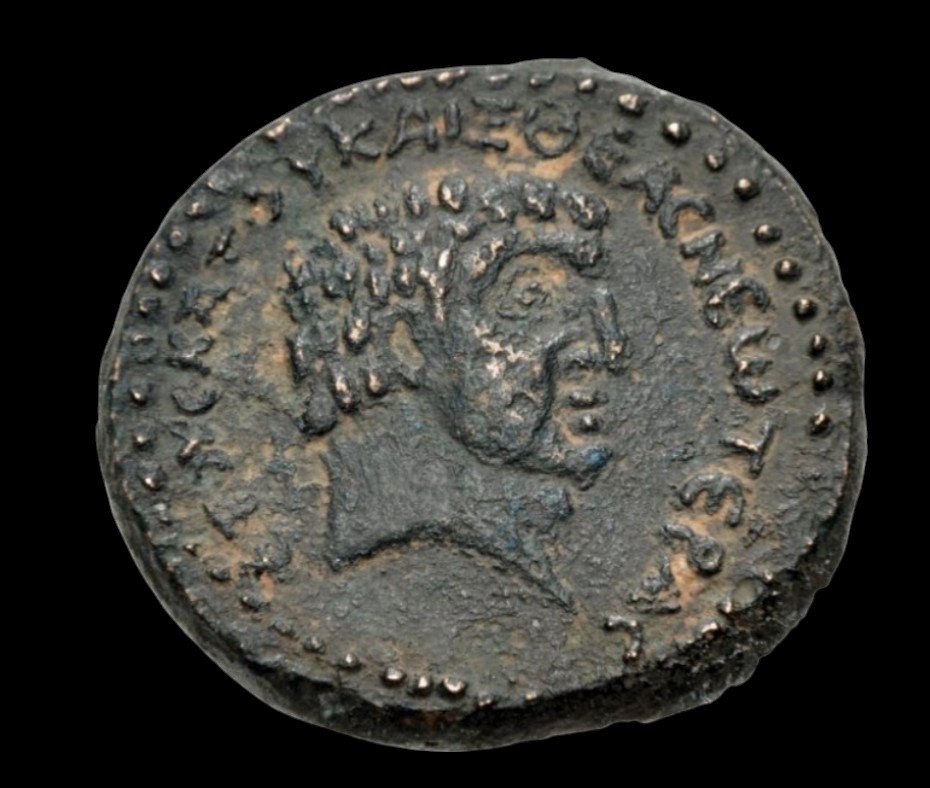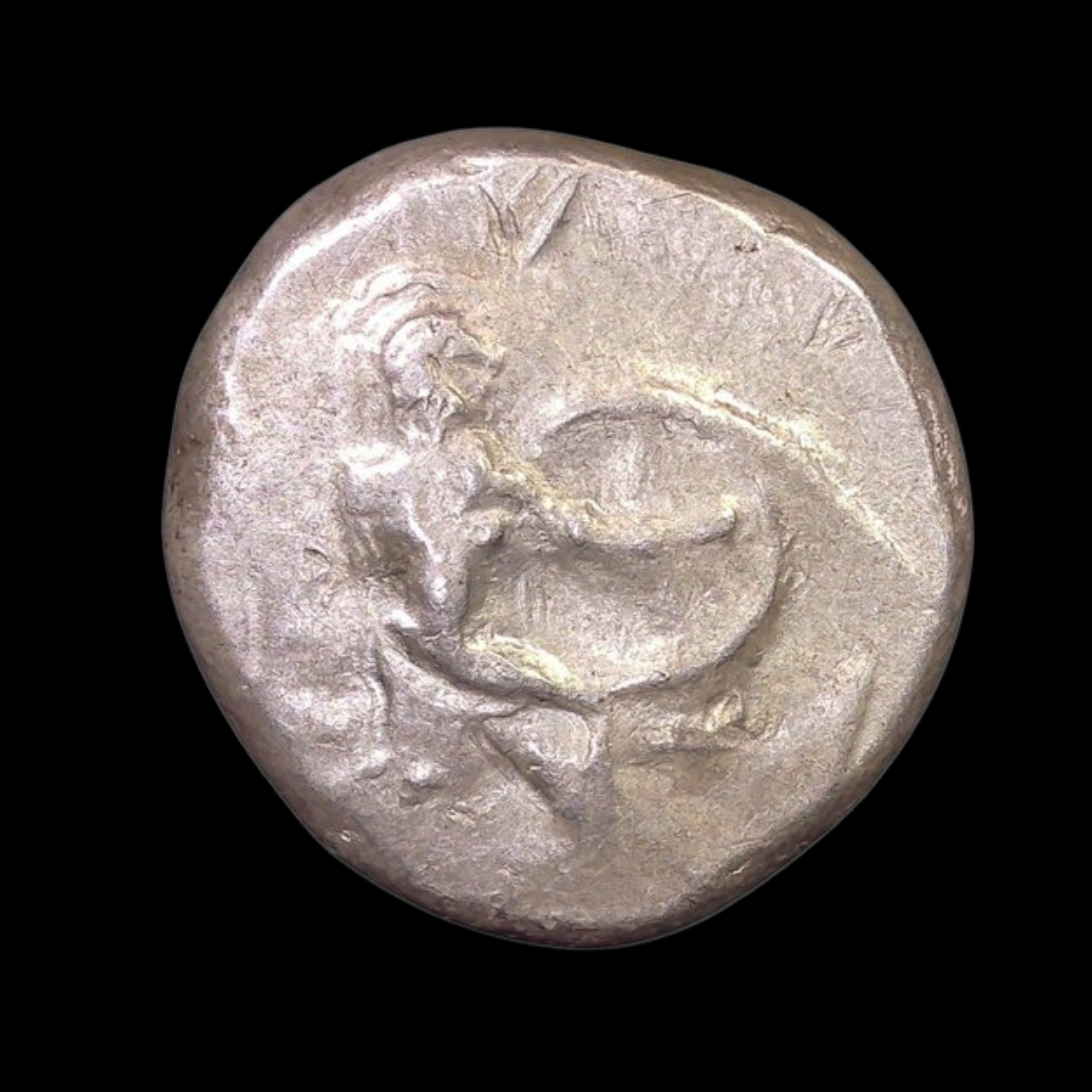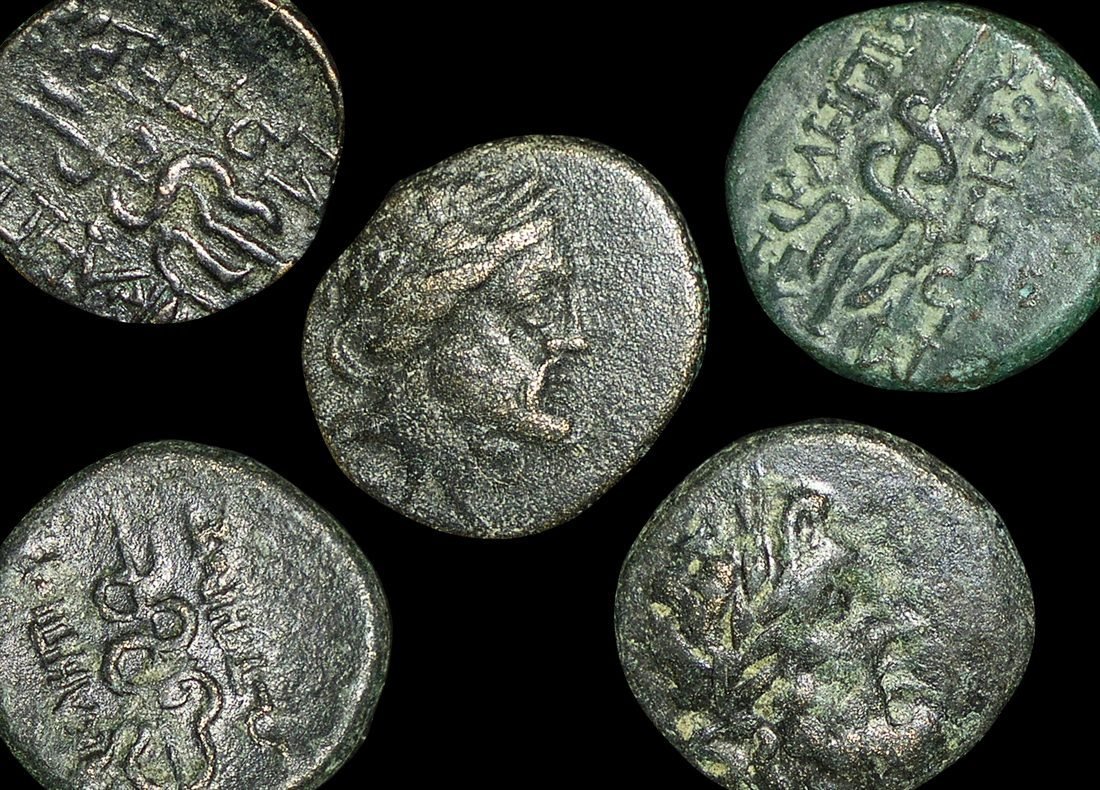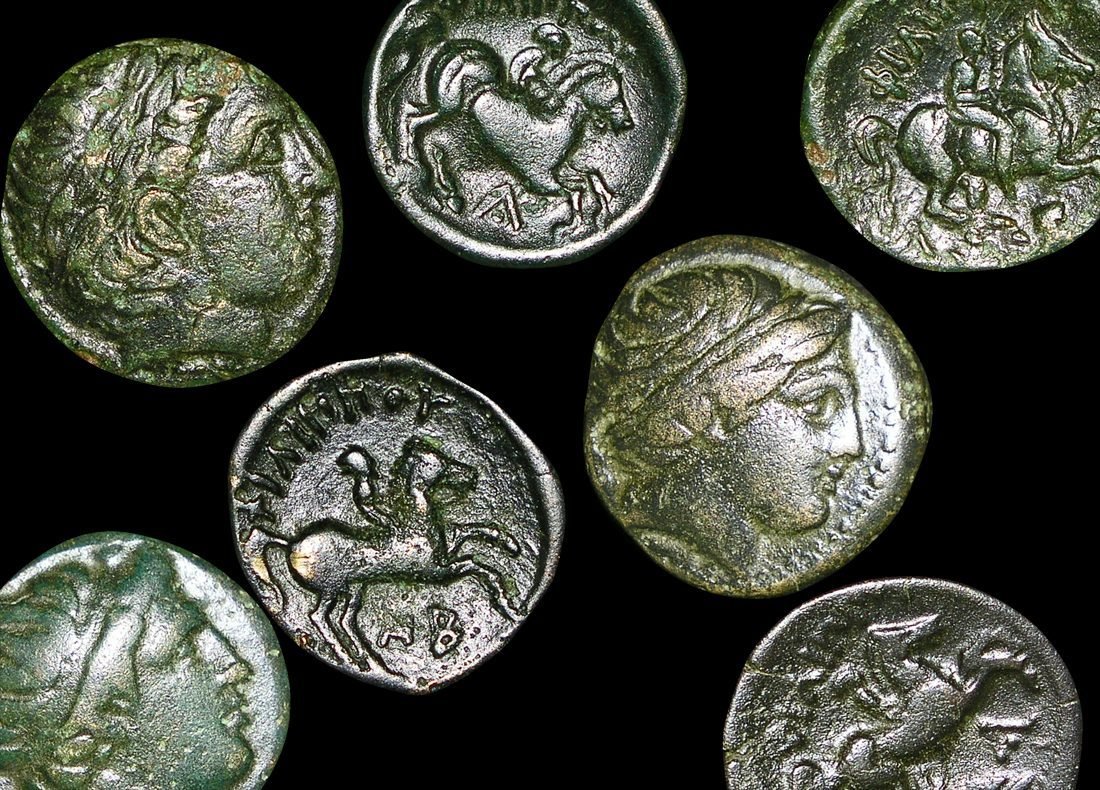 Image 1 of 2
Image 1 of 2

 Image 2 of 2
Image 2 of 2



Winged Eros Bronze Coin from Seleucid Empire (2,160 years ago)
This bronze coin was minted in Antioch on the Orontes (modern-day Antakya, Turkey) during the brief reign of Antiochos VII Euergetes of the Seleucid Empire in 137-136 BC. It represents a period when the once-powerful Seleucid kingdom was struggling to maintain control over its territories.
Coin Description:
Front side: Winged bust of Eros (the god of love) facing right.
Back side: Isis headdress (Egyptian crown) resting on two grain ears and an inverted crescent; to the outer left appears a monogram.
Technical Details:
Material: Bronze
Size: 16.6mm diameter
Weight: 4.28 grams
Period: 137-136 BC
Mint: Antioch on the Orontes
Catalog Reference: SC 2067.3a
Historical Significance:
This coin demonstrates the cultural fusion of Greek and Egyptian religious elements that characterized the Hellenistic kingdoms following Alexander the Great's conquests. The depiction of Eros (Greek) alongside the Isis headdress (Egyptian) reflects the Seleucid Empire's multiethnic composition and religious pluralism. Antiochos VII was one of the last effective Seleucid rulers before the empire's territory was gradually absorbed by Rome and Parthia, making this coinage historically important as evidence of the declining empire's continued cultural and economic activity in what is now Syria and southern Turkey.
This bronze coin was minted in Antioch on the Orontes (modern-day Antakya, Turkey) during the brief reign of Antiochos VII Euergetes of the Seleucid Empire in 137-136 BC. It represents a period when the once-powerful Seleucid kingdom was struggling to maintain control over its territories.
Coin Description:
Front side: Winged bust of Eros (the god of love) facing right.
Back side: Isis headdress (Egyptian crown) resting on two grain ears and an inverted crescent; to the outer left appears a monogram.
Technical Details:
Material: Bronze
Size: 16.6mm diameter
Weight: 4.28 grams
Period: 137-136 BC
Mint: Antioch on the Orontes
Catalog Reference: SC 2067.3a
Historical Significance:
This coin demonstrates the cultural fusion of Greek and Egyptian religious elements that characterized the Hellenistic kingdoms following Alexander the Great's conquests. The depiction of Eros (Greek) alongside the Isis headdress (Egyptian) reflects the Seleucid Empire's multiethnic composition and religious pluralism. Antiochos VII was one of the last effective Seleucid rulers before the empire's territory was gradually absorbed by Rome and Parthia, making this coinage historically important as evidence of the declining empire's continued cultural and economic activity in what is now Syria and southern Turkey.
This bronze coin was minted in Antioch on the Orontes (modern-day Antakya, Turkey) during the brief reign of Antiochos VII Euergetes of the Seleucid Empire in 137-136 BC. It represents a period when the once-powerful Seleucid kingdom was struggling to maintain control over its territories.
Coin Description:
Front side: Winged bust of Eros (the god of love) facing right.
Back side: Isis headdress (Egyptian crown) resting on two grain ears and an inverted crescent; to the outer left appears a monogram.
Technical Details:
Material: Bronze
Size: 16.6mm diameter
Weight: 4.28 grams
Period: 137-136 BC
Mint: Antioch on the Orontes
Catalog Reference: SC 2067.3a
Historical Significance:
This coin demonstrates the cultural fusion of Greek and Egyptian religious elements that characterized the Hellenistic kingdoms following Alexander the Great's conquests. The depiction of Eros (Greek) alongside the Isis headdress (Egyptian) reflects the Seleucid Empire's multiethnic composition and religious pluralism. Antiochos VII was one of the last effective Seleucid rulers before the empire's territory was gradually absorbed by Rome and Parthia, making this coinage historically important as evidence of the declining empire's continued cultural and economic activity in what is now Syria and southern Turkey.
Antiochus VII Euergetes (Greek: Ἀντίοχος Ευεργέτης; c. 164/160 BC[1] – 129 BC), nicknamed Sidetes (Greek: Σιδήτης) (from Side, a city in Asia Minor), also known as Antiochus the Pious,[2] was ruler of the Hellenistic Seleucid Empire from July/August 138 to 129 BC.[3] He was the last Seleucid king of any stature. After Antiochus was killed in battle, the Seleucid realm was restricted to Syria.
He was one of the sons of Demetrius I Soter, the brother of Demetrius II Nicator and his mother may have been Laodice V. Antiochus was elevated after Demetrius was captured by the Parthians. He married Cleopatra Thea, who had been the wife of Demetrius. Their offspring was Antiochus IX, who thus became both half-brother and cousin to Seleucus V and Antiochus VIII.
In his nine-year reign, Antiochus made some effort to undo the massive territorial and authority losses of recent decades. Antiochus defeated the usurper Diodotus Tryphon at Dora[4] and laid siege to Jerusalem in 134 BC. During the siege he allowed a seven-day truce for the Jews to celebrate a religious festival, impressing the Jewish leadership.[5] According to Josephus[6] the Hasmonean leader John Hyrcanus opened King David's sepulchre and removed three thousand talents, which he then paid Antiochus to spare the city. Nevertheless, King Antiochus' respectful treatment of the Jews, and respect for their religion, earned him their gratitude and added name Euergetes ("the Benefactor"). With no Jewish sources of that time (the Book of Maccabees ends a few years before his time), it is unclear if the siege of Jerusalem ended with a decisive Seleucid victory or simply a peace treaty. Furthermore, Jewish forces later assisted Antiochus in his wars, and for nearly 20 years after his death, John Hyrcanus refrained from attacking areas under Seleucid control.
You Might Also Like











